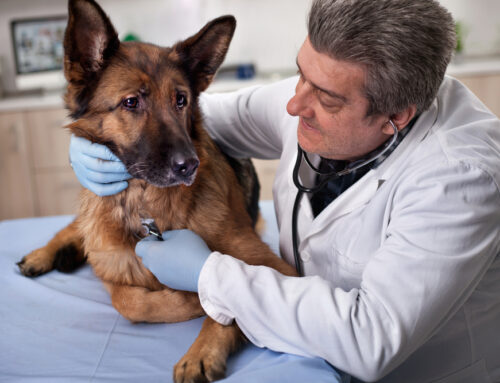Pet owners know their pet’s likes, dislikes, and daily habits, and can often set the clock by their pet’s demand for dinner. However, sudden changes in your pet’s daily habits or behavior can concern pet owners. For example, your pet may occasionally cough, likely because of a sudden irritation in a dog, or a furball in your frisky feline, but if they suddenly develop a consistent cough, that may indicate a more serious health problem. Your pet may cough for numerous reasons, so our Guam Pet Hospital team describes six common causes of coughing in pets, and steps that you can take to determine the underlying cause.
#1: Infections in pets
Pets explore the world with their noses and mouths, which makes resisting taste-testing every smell during their daily walks or trips to the dog park extremely difficult. Numerous bacteria, viruses, and fungi can lead to an infection-causing cough in your pet, with kennel cough (i.e., tracheobronchitis) the most commonly diagnosed infectious cough in pets. Kennel cough is caused primarily through exposure to the highly contagious bacteria Bordetella bronchiseptica, but may also result from a variety of infectious bacteria or viruses. In most cases, the viral or infectious agent infects the pet’s upper airway, although kennel cough can progress to severe bronchitis and/or pneumonia in the lower respiratory tract, and can be life-threatening without treatment. Depending on the underlying cause, kennel cough may resolve without treatment, although antibiotics, cough suppressants, and supportive care may be required in more severe cases. Fortunately, vaccinating your pet can prevent severe kennel cough infections.
#2: Heartworm disease in pets
Guam residents are no strangers to itching, irritating mosquito bites, and your four-legged companions can suffer similarly. However, a mosquito bite in pets can cause more than an itchy skin welt—only one bite can be deadly to pets. Heartworm disease can occur when an infected mosquito bites your pet and transfers the parasite larvae to your pet’s circulatory system, where the larvae mature to adult worms, and migrate to your pet’s heart and lungs. The worms can cause life-threatening inflammation and damage to your pet, who will develop a persistent cough. The treatment available for dogs with heartworm disease is high-risk and costly, and no heartworm disease treatment is approved for cats, so monthly preventive medication is essential for pet protection against this potentially deadly disease.
#3: Tracheal collapse in pets
Your pet’s trachea (i.e., windpipe), which is the tube connecting the throat to the lungs, is partially surrounded by small cartilage rings that provide structural support. Loss of strength or rigidity in these rings can cause the trachea to flatten when your pet takes a breath. Tracheal collapse in pets often occurs following exercise or excitement, and is characterized by a goose-honk sounding cough that may occur more often at night. Middle-aged, small-breed, overweight dogs are most at risk for tracheal collapse. Most pets will experience some coughing, regardless of treatment, which may include anti-inflammatory medication, cough suppressants, or antibiotics. Our Guam Pet Hospital veterinarian may recommend surgical correction in severe cases, but surgery is a complex procedure.
#4: Heart disease in pet
More than 10% of pets will be diagnosed with some form of cardiovascular (i.e., heart) disease. Numerous heart abnormalities can lead to heart disease in pets, including a malfunction in the heart’s ability to properly pump blood throughout the body, which can result in fluid accumulation in the lungs (i.e., pulmonary edema). Pets with congestive heart failure (CHF) will cough more as the disease progresses, and pulmonary edema worsens. Pets with CHF will often have concurrent signs, such as an increased respiratory rate or exercise intolerance, and will also cough when sleeping or lying down. Some forms of heart disease also cause an enlarged heart, which can place pressure on the lungs, and cause coughing. Your pet needs immediate veterinary care if they have difficulty breathing, or a persistent, severe cough.
#5: Feline asthma in cats
Feline asthma is a progressive, lower airway lung disease caused by an allergic reaction, which then stimulates the affected cat’s immune system with varied severity. Some cats will experience a chronic cough, in addition to wheezing, difficulty breathing, or vomiting. Cats who are diagnosed will require lifelong treatment, which often includes medications, such as corticosteroids, to decrease inflammation.
#6: Cancer in pets
Cancer of the lungs, heart, surrounding tissues, or other portions of the respiratory system can obstruct the airway, or cause tissue damage, which can lead to difficulty breathing and/or coughing in your pet. In some cases, a cough may be the first sign that a pet is suffering from cancer.
Diagnosing and treating your pet’s cough

An occasional cough is likely not problematic in pets, but chronic, progressive coughing is often a sign that your pet requires veterinary care. Pets who have difficulty breathing and/or a continuous cough will require immediate veterinary care, as some cough-causing conditions, such as CHF, can be life-threatening. Our Guam Pet Hospital veterinarian will perform a nose-to-tail examination, and discuss your pet’s behavioral and vaccination history. Ensure you inform our veterinarian if your pet has been exposed to other pets. Treatment will depend on the underlying cause of your pet’s cough.
Recommended diagnostic tests may include:
- Complete blood count
- Serum biochemistry test
- Urinalysis
- Fecal test
- Chest X-rays
- Echocardiogram (i.e., heart ultrasound)
- Blood pressure test
- Electrocardiogram (EKG)
- Heartworm test
- Lung fluid analysis
- Heart disease testing
- Bronchoscopy
- Computed tomography
If your pet is persistently coughing, call our Guam Pet Hospital office as soon as possible and schedule them for an appointment, so that we can determine the underlying cause and help alleviate their discomfort.








Leave A Comment